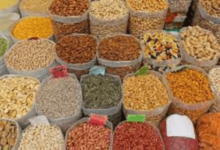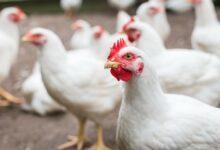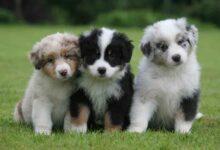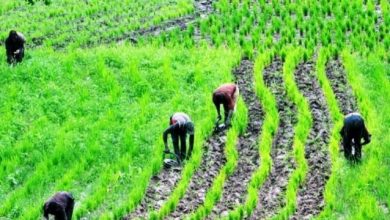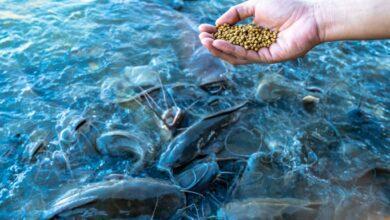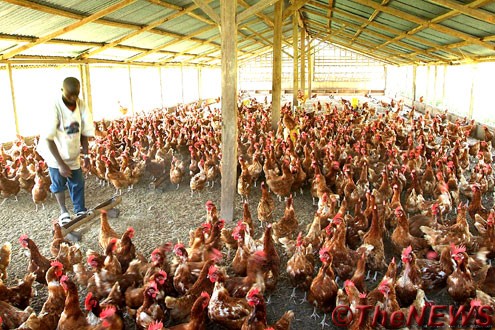
9 Problems Facing Animal Husbandry In Nigeria
Problems Facing Animal Husbandry In Nigeria –
Animal husbandry in Nigeria is faced with a number of problems including diseases, limited access to veterinary services, poor genetics, feeding challenges, lack of infrastructure, climate change, inadequate government policies, limited access to finance, and limited research and development. These problems affect the productivity and sustainability of the animal husbandry sector in Nigeria and can lead to low-quality products and reduced income for farmers.InformationGuideNigeria
Addressing these problems requires government policies, investment in infrastructure, research, and support for farmers to improve their knowledge and skills. We will focus more on problems facing animal husbandry in Nigeria in this article.
👉 Relocate to Canada Today!
Live, Study and Work in Canada. No Payment is Required! Hurry Now click here to Apply >> Immigrate to CanadaRead Also: History of Nigeria Labour Congress [NLC]
What Is Animal Husbandry
Animal husbandry is the management and care of farm animals, such as cows, pigs, sheep, and poultry, by humans for the purpose of producing food, fiber, and other products. This includes breeding, feeding, and housing the animals, as well as providing for their health and welfare. Animal husbandry is an important aspect of modern agriculture and is practiced around the
Forms Of Animal Husbandry
- Dairy Farming:
Dairy farming is the process of raising and caring for dairy cows in order to produce milk. The milk is then processed and packaged for consumption. Dairy farming is an important aspect of the livestock industry as it provides a source of nutrition and income for many farmers. It requires a significant investment in infrastructure such as barns, milking equipment, and feed. The industry also requires skilled labor and management to ensure the health and well-being of the cows and the quality of the milk produced.
- Beef Farming:10 Factors Affecting Exchange Rate In Nigeria
Beef farming is the process of raising and caring for cattle in order to produce meat for consumption. Beef farming is a significant component of the livestock industry as it provides a source of protein for human consumption. It requires a significant investment in infrastructure such as pastureland, feed, and housing for the cattle. The industry also requires skilled labor and management to ensure the health and well-being of the cattle and the quality of the meat produced.
- Poultry Farming:
Poultry farming is the process of raising and caring for chickens, turkeys, ducks, geese, and other birds for the purpose of producing eggs and meat for consumption. Poultry farming is a significant component of the livestock industry as it provides a source of protein and income for many farmers. It requires a significant investment in infrastructure such as poultry houses, feed, and equipment. The industry also requires skilled labor and management to ensure the health and well-being of the birds and the quality of the eggs and meat produced.
Read Also: Who Is The Founder of APC? History Of APC In Nigeria
- Pig Farming:10 Health Challenges in Northern Nigeria
Pig farming is the process of raising and caring for pigs for the purpose of producing pork for consumption. Pig farming is a significant component of the livestock industry as it provides a source of protein and income for many farmers. It requires a significant investment in infrastructure such as pens, feed, and equipment. The industry also requires skilled labor and management to ensure the health and well-being of the pigs and the quality of the pork produced
- Aquaculture:
Aquaculture is the farming of aquatic organisms such as fish, shellfish, and seaweed. It is a growing component of the livestock industry as it provides a source of protein and income for many farmers. Aquaculture can be done in both freshwater and marine environments, and it requires a significant investment in infrastructure such as ponds, tanks, and equipment. The industry also requires skilled labor and management to ensure the health and well-being of the aquatic organisms and the quality of the products produced.
👉 Relocate to Canada Today!
Live, Study and Work in Canada. No Payment is Required! Hurry Now click here to Apply >> Immigrate to CanadaRead Also: History of cultism in Nigeria: Interesting facts and details
History Of Animal Husbandry In Nigeria
Animal husbandry has a long history in Nigeria, dating back to ancient times. Historically, the people of Nigeria relied on a variety of animals for food, transportation, and other needs. Cattle, sheep, goats, and chickens were among the most important animals, and were kept by many communities.
During the colonial period, British administrators introduced new forms of animal husbandry, such as dairy farming and beef production. These practices were primarily aimed at providing food for the colonial administration and for export. However, many traditional forms of animal husbandry continued to be practiced alongside these new forms.9 Problems Facing Animal Husbandry In Nigeria
After Nigeria gained independence in 1960, the government focused on increasing food production and improving the livelihoods of farmers. This led to a greater emphasis on animal husbandry, and many programs were established to improve the breeding, feeding, and management of farm animals.
In recent years, the Nigerian government has been working to promote modern forms of animal husbandry, such as large-scale commercial poultry farming and dairy production. However, many small-scale farmers still rely on traditional forms of animal husbandry to provide for their families and communities.
Overall, the history of animal husbandry in Nigeria has been shaped by a combination of traditional practices and modern innovations, with the goal of meeting the needs of the population.
Roles Of Animal Husbandry In Nigeria
- Food Security:
Livestock production is a major source of protein for the Nigerian population, providing meat, milk, and eggs for consumption.
- Employment:
The livestock industry provides employment opportunities for a large number of people in rural areas, including farmers, herders, and processors.JAMB Result
- Economic Development:
The livestock industry is a significant contributor to the Nigerian economy, generating income for farmers and supporting related industries such as feed production, veterinary services, and transportation.
- Foreign Exchange:
Exportation of livestock and livestock products generates foreign exchange for the country.
- Rural Development:
The livestock industry helps to support the development of rural communities by providing income, employment, and other economic opportunities.
Read Also: The History of Online Casinos
Problems Facing Animal Husbandry In Nigeria
There are several problems facing animal husbandry in Nigeria, including:
- Disease:
Animal diseases such as foot-and-mouth disease, Newcastle disease, and trypanosomiasis are common in Nigeria and can have a significant impact on animal health and production.
- Limited Access To Veterinary Services:
Many farmers in Nigeria have limited access to veterinary services, which makes it difficult to prevent and treat animal diseases.
- Poor Genetics:
Many animals in Nigeria have poor genetics, which can lead to low productivity and poor-quality products.
- Feeding:
Feeding is a major challenge for animal farmers, as high-quality feed is expensive and often difficult to obtain. Many farmers rely on low-quality feed, which can lead to poor animal health and productivity.
- Lack Of Infrastructure:
There is a lack of infrastructure such as processing plants, storage facilities and cold storage which makes it difficult for farmers to preserve and market their products.
- Climate Change:
The changing climate is affecting the livelihoods of farmers in Nigeria. Drought, floods, and extreme weather conditions are making it difficult for farmers to produce enough food and water for their animals.
- Inadequate Government Policies:
There is a lack of policies and initiatives that support the growth and development of the animal husbandry industry in Nigeria.105 Good Morning Love Messages
- Limited Access To Finance:
Many small-scale farmers in Nigeria have limited access to finance, which makes it difficult for them to invest in animal husbandry and improve their production.
- Inadequate Research And Development:
There is a lack of research and development in animal husbandry in Nigeria, which limits the potential for improvements in productivity and sustainability.
Addressing these problems will require a combination of government policies, investment in infrastructure and research, and support for farmers and herders to improve their knowledge and skills.
Solution to problems facing animal husbandry in nigeria
- Disease Control:
One of the main solutions to the problem of disease in animal husbandry in Nigeria is to improve access to veterinary services, vaccinations, and other disease control measures. This can be achieved by increasing funding for veterinary services, training more veterinarians and animal health workers, and providing farmers with the necessary knowledge and skills to prevent and control diseases.NYSC Portal
- Genetic Improvement:
Improving the genetics of animals in Nigeria can help to increase productivity and improve the quality of animal products. This can be achieved by introducing improved breeds, providing artificial insemination services, and implementing breeding programs that focus on genetic improvement.
- Feeding And Nutrition:
Improving the quality and availability of feed and nutrition can help to increase animal productivity and reduce the impact of feeding challenges in Nigeria. This can be achieved by investing in research and development to improve the quality and availability of feed, and providing farmers with the necessary knowledge and skills to manage and improve their animal feeding practices.200 Romantic Love Message
- Infrastructure Development:
Improving infrastructure in Nigeria can help to support the growth and development of the animal husbandry sector. This includes building processing plants, storage facilities, and cold storage, as well as investing in transportation and logistics to improve the flow of animal products to market.
- Government Policies And Support:JAMB Portal
Government policies and support can play a key role in addressing the challenges facing animal husbandry in Nigeria. This can include providing financial support to farmers, investing in research and development, and implementing policies that promote sustainable animal husbandry practices.
Read Also: History of Labour Party Nigeria Who is the Founder of Labour Party in Nigeria
Conclusion
Animal husbandry in Nigeria is faced with a range of challenges that impede its productivity and sustainability. These challenges include diseases, limited access to veterinary services, poor genetics, feeding challenges, lack of infrastructure, climate change, inadequate government policies, limited access to finance, and limited research and development. Addressing these issues will require a concerted effort from the government, private sector, and development partners to improve the livelihoods of farmers and the overall competitiveness of the animal husbandry sector in Nigeria. This includes investment in research and development, infrastructure, and providing farmers with the necessary knowledge and skills. Addressing these challenges will help to improve the productivity and sustainability of the animal husbandry sector in Nigeria and will play a key role in achieving food security and economic growth in the country.
Check JAMB Result
Check and Confirm: How much is Dollar to Naira
